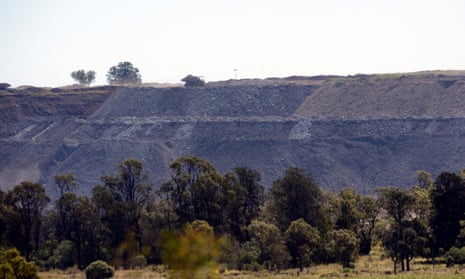Environmental groups say “paltry” fines handed to a coalmine in Queensland’s Darling Downs show that state authorities are unwilling to take action over even the most serious and repeated environmental breaches by miners.
Documents obtained under Queensland freedom of information laws by Guardian Australia show the New Acland coalmine in Queensland’s Darling Downs was caught violating noise limits 34 separate times in 10 weeks and was fined $9,461 by state authorities.
The Department of Environment and Science decided against pursuing a more serious penalty, despite finding the facts were “indisputable”, the noise created a “major impact” and the miner’s actions were “intentional”.
Last year Guardian Australia revealed the same miner drilled 27 illegal bores in the Darling Downs and received a $3,152 fine.
In both cases, the department believed the fines would act as a deterrent to the company. Its parent, New Hope Group, was worth about $2.3bn at the time.
A decision memo outlined that the department began an investigation in January 2018 into whether New Acland was complying with noise limits in its environmental authority.
Between June and August 2018, the department conducted noise monitoring at the site. A report on the monitoring outlined how on 34 occasions during that period, the noise levels measured exceeded limits in New Acland’s environmental authority.
On one occasion, the noise exceeded World Health Organisation criteria for sleep disturbance, due to more than 10 “impulse events” during a one-hour period.
The memo, dated April 2019, says the department had told New Acland it had concerns about noise from mining activities, but that the miner had taken no action.
“DES has informed [New Acland] of its mining activities’ alleged impact to the acoustic objectives of sensitive receptors and no additional abatement measures have been employed,” it said.
“Mining activities subject to noise complaints have continued therefore it is alleged that the actions are intentional, however it is not clear that the causing of the nuisance is wilful.”
The memo argued the lesser penalty should be imposed – despite the “ongoing nature of the offence” – because it was difficult to prove what activities were causing the noise impacts.
The department released a statement to the Toowoomba Chronicle newspaper in May 2019 about the fine, which it described as “strong enforcement action”. However, until the release of the memo more than a year later, no information was made public about the extent of the breaches, their alleged seriousness and the department’s internal considerations.
Lock the Gate, which obtained the decision memo, says the document shows the environmental regulator is “a toothless tiger”.
“According to their own compliance guideline, DES should have prosecuted New Hope for this ongoing offence that caused a major impact,” Lock the Gate Queensland spokeswoman Ellie Smith said.
“Instead they were handed a paltry fine of just $9,461, which will do nothing to bring this rogue company and repeat offender into line.
“New Acland absolutely should have been prosecuted, because the document shows the noise had a major impact and that New Acland was culpable.
“This failure by the government to appropriately penalise New Acland, which has a history of serious violations, is an insult to the communities and farmers who have been devastated by this mine.”
New Hope said in a statement that it was “committed to continuous improvement of our operations” and had implemented extensive management measures to address potential noise and vibration impacts at the mine.
A spokesman for the company said the measures included real-time monitoring; adaptive measures to reduce, relocate or stop noisy activities; an after-hours contact number for neighbours; installing mufflers on mining equipment; and using stockpiles as noise barriers for works where possible.
A department spokesman said the fine “was considered an appropriate enforcement response based on the circumstances of the alleged offence”.
“DES continues to monitor the activities of the New Acland coalmine.”
New Acland has been under investigation by Queensland authorities for two years in relation to allegations of illegal mining, related to activities conducted within its mining lease, but outside areas defined as “pits” on its environmental approval.
The ABC reported last week the miner was now also being investigated by federal environment authorities for alleged noncompliance.
New Hope said it “vehemently rejects any suggestion it is unlawfully mining at Acland”.
“This is yet another example of opportunistic green activist groups, with an agenda, bringing up spurious claims and using lawfare against New Hope Group in an attempt to frustrate and delay the approvals of New Acland stage 3, delaying vital job-creating projects in regional Queensland.”
The long-proposed expansion of the mine remains in limbo. Earlier this month landholders won the right to take an appeal against the expansion’s environmental approval to the high court. Meanwhile, New Hope Group has continued to lobby the state government to grant its final approvals, which include mining leases and a water licence.
It says the project will create 487 jobs in 18 months and contribute $7bn to the state economy.
